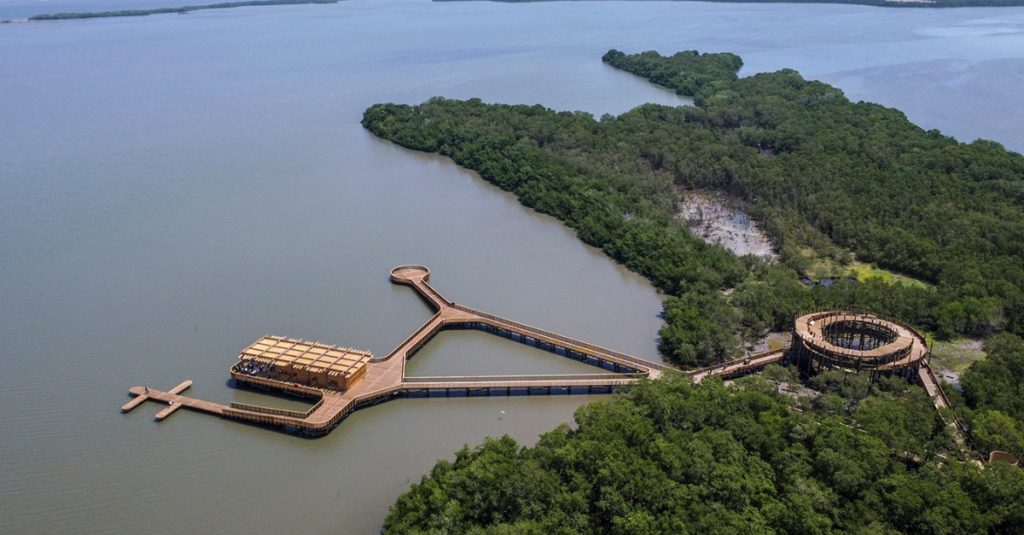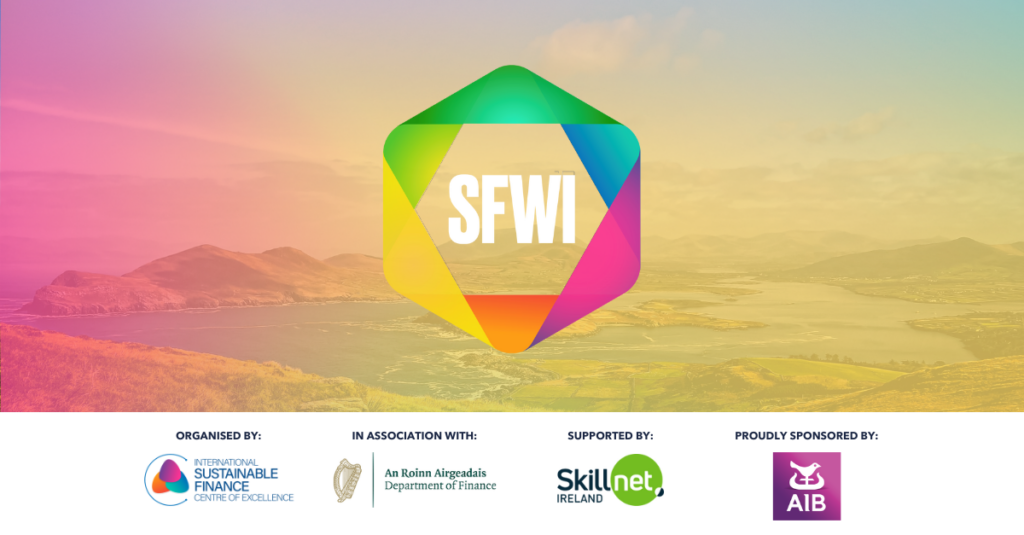ISFCOE Research Insights Monthly Digest: October 2024
Over the past four years, ISFCOE has provided expert insights and evidence-based solutions to inform public discourse and policymaking on sustainable finance. We maintain a keen awareness of global sustainability initiatives, acting as a knowledge and learning hub. Through this monthly research digest, we scan the sector to highlight key research and news published in sustainable finance here in Ireland and globally, creating a repository of very useful studies and information.
2024 United Nations Biodiversity Conference (COP16)
The 16th edition of the world’s premier Biodiversity Summit – the COP of the UN Convention on Biological Diversity (CBD) – is currently underway in Cali, Colombia, running from October 21 to November 1, 2024.
The United Nations Conference on Biodiversity (known as COP16) is a call for reflection to reconcile with the environment and to rethink an economic model that does not prioritise the extraction, overexploitation and pollution of nature.
The COP, or Conference of the Parties, serves as the primary forum for discussions and negotiations under the United Nations Convention on Biological Diversity (CBD). At COP16, countries aim to tackle issues surrounding biodiversity conservation, the sustainable use of its components, and the fair and equitable sharing of benefits from genetic resource utilization. The goal is to seek solutions to some of the planet’s most pressing environmental challenges.
COP16 will be the first since the adoption of the Kunming-Montreal Global Biodiversity Framework at COP 15 in December 2022. This framework functions as a roadmap for the 196 countries party to the Convention to take action at the national level to meet its 4 goals and 23 targets to halt and reverse biodiversity loss by 2030, among which the UN highlights:
- Conserve at least 30% of the world’s land, marine and coastal areas.
- Restore at least 20% of each of the degraded freshwater, marine and terrestrial ecosystems, with special attention to priority ecosystems.
- Reduce the rates of introduction of other known or potential invasive species by at least 50 per cent.
- Reduce nutrients lost to the environment by at least half, and chemicals, especially pesticides, which are harmful to biodiversity, by at least two thirds.<‘li>
- Eliminate the dumping of plastic waste.
- Minimise the impact of climate change on biodiversity, contribute to mitigation, adaptation and resilience through Nature-Based Solutions and ecosystem-based approaches.
- Mobilise a $200 billion increase in international financial flows from all sources to developing countries.
- Ahead of COP16, participating countries are expected to submit updates to their National Biodiversity Strategies and Action Plans (NBSAPs). These updates are designed to guide national planning and outline a roadmap for implementing specific targets and strategies. Countries including Spain, China, Japan, Luxembourg, France, and Hungary have already submitted their updates to the CBD.

Urgent calls for action as global leaders gather in Cali
The United Nations COP16 biodiversity summit is entering its final week in the Colombian city of Cali, where international negotiations are underway to clarify the implementation of the Global Biodiversity Framework (GBF), adopted by nearly 200 countries at the end of 2022. The GBF includes 23 targets, including the famous ‘30 by 30’ target in which more than 100 countries committed to protecting 30% of the planet’s lands and oceans by 2030.
The UNEP report found countries have made some headway on pledges, but that expansion of the global network must accelerate over the next six years to meet the goal. The report says 17.6% of land and inland waters and 8.4% of the ocean and coastal areas globally are within documented protected and conserved areas. In addition to environmental policies, major financial discussions are underway. According to the United Nations, there is an urgent need to triple green investments to meet the ambitious targets set for 2030.
‘A message of hope’: 6 European countries pledge €130 million to protect biodiversity
Six European countries have pledged new money to the world’s foremost biodiversity fund, which gained €200 million yesterday. Austria, Denmark, France, Germany, Norway and the UK announced fresh funding at the UN biodiversity summit, COP16, currently taking place in Colombia.
The Global Biodiversity Framework Fund (GBFF) was one of the key outcomes of the Kunming-Montreal Agreement struck at the previous COP15 in 2022. The UK, Germany, Spain and Luxembourg previously contributed to the GBFF after it was launched last year. European countries now make up eight of the fund’s 12 donors, which also include Canada, Japan, New Zealand and – in an unusual show of leadership from a sub-national government – Québec.
The GBFF channels funds to countries and communities committed to conserving, restoring, and securing the long-term health of wild species and ecosystems. Managed by the Global Environment Facility, it gathers contributions from diverse sources, including public, private, and philanthropic entities.
In June 2024, the GBFF approved its first projects in Brazil, Fiji, Gabon, and Mexico. For instance, the Mexico project aims to strengthen national protected areas, advancing the GBFF’s ‘30×30’ target to protect 30 percent of the planet by 2030.
Currently, 24 developing countries are benefiting from GBFF support, and an additional 18 project preparation grants were approved this summer. Notably, the fund seeks to ensure that 20 percent of its resources directly support initiatives led by Indigenous peoples and local communities, who research shows are among the most effective stewards of nature.
From most to least, here are the funds that European countries have pledged to the Global Biodiversity Framework Fund so far.
- Germany will contribute €50 million to the GBFF in 2024. On top of its €40 contribution from 2023, the country’s offering totals €90 million.
- The UK is contributing £45 million (roughly €54 million) to the GBFF, in addition to its contribution of £10 million from 2023. So around €66 million in total.
- Denmark is contributing 100 million Danish kroner (around €13.4 million) this year.
- Norway will contribute 150 million Norwegian kroner (around €12.7 million), subject to parliamentary approval.
- Spain pledged €10 million to the GBFF earlier this year.
- Luxembourg also promised €7 million towards the fund at the United Nations Environment Assembly in February.
- France announced it will contribute €5 million in 2024.
- Austria is contributing €3 million to the GBFF, pending final internal approval.
Additional pledges from Canada, Japan, New Zealand and Québec have added $163 million (€196 million) to the fund this week.

UNEP unveils new framework to track and bridge gap in urban nature finance
This report was released during the 8th Summit for Subnational Governments and Cities at the UN Biodiversity Conference, known as COP16. Published with the University of Pennsylvania, this report is a derivative of UNEP’s State of Finance for Nature series. The report was released during the 8th Summit for Subnational Governments and Cities at the UN Biodiversity Conference, or COP16. Published with the University of Pennsylvania, this report is a derivative of UNEP’s State of Finance for Nature series. Through simplified data collection and enhanced city-wide financial planning, the framework empowers cities to better track and assess the impacts of nature-based solutions. Further, the framework highlights structural barriers that hinder their scaling and offers a roadmap for cities to overcome these challenges and champion nature-positive development.
The report aligns strongly with the Kunming-Montreal Global Biodiversity Framework. It shows how urban nature-based solutions are vital strategies that offer the triple benefits of enhancing biodiversity, building climate resilience, and protecting residents’ wellbeing.
Please read the report, here.
Sustainable Finance News Roundup
1. Cost of failing to meet climate targets could exceed €8bn – Advisory Council
The Climate Change Advisory Council has noted that, while greenhouse gas emissions declined in most sectors last year, the rate of reduction remains insufficient to meet both national and EU climate commitments. The Council cautions that failing to achieve Ireland’s 2030 climate targets could result in costs exceeding €8 billion and calls for strong, coordinated action across all sectors to eliminate dependence on fossil fuels. This year, the Council has released seven reports assessing the climate performance of various economic sectors. Today’s report consolidates these findings into a comprehensive cross-sectoral review, underscoring the urgency for Ireland to end its reliance on fossil fuels. The Climate Change Advisory Council also says it is imperative that the new National Planning Framework is strengthened and adopted in full before the end of the year. This is to support the expansion of renewable energy infrastructure, and reduce emissions associated with new building developments and the transport system. Please read the full opinion piece, here.
2. Real risk’ that climate aid talks will fail, key COP29 negotiator warns
Irish Environment Minister Eamon Ryan, who is appointed to co-lead part of the negotiations at the COP29 summit in Azerbaijan, warned that there’s a “real risk” of failure. At the Baku summit, which starts in less than a month, countries are meant to set a new long-term financial target to fund climate action in developing countries. The current target of $100 billion a year is widely considered insufficient, and some developing nations are asking for that number to increase to $1 trillion or more. Industrialised countries, including the EU, say additional funding is contingent onexpanding the group of contributors to emerging economies such as China. The EU is also advocating for a “multi-layered” funding goal at COP29, encompassing a target for public finance complemented by funds raised from the private sector, development banks and other sources. Please read the full news article, here.
3. The ESAs finalise rules to facilitate access to financial and sustainability information on the ESAP
The three European Supervisory Authorities (EBA, EIOPA and ESMA – the ESAs) today published the Final Report on the draft implementing technical standards (ITS) regarding certain tasks of the collection bodies and functionalities of the European Single Access Point (ESAP). The ESAP is foreseen in Level 1 legislation to be a two-tier system, where information is first submitted by entities to the “collection bodies” – Officially Appointed Mechanisms (OAMs), offices and agencies of the EU, national authorities, among others – and then made available by the collection bodies to the ESAP. These ITS are the first milestone for the successful establishment of a fully operational ESAP.
The requirements are designed to enable future users to be able to access and use financial and sustainability information effectively and effortlessly in a centralised ESAP platform. Please read the full report, here.
4. European Sustainability Funds Surge to €8 Trillion Under SFDR Article 8 and 9 Rules: MSCI Report
The report highlights the following key impact points:
- Sustainability at the Forefront: Sustainability-related funds accounted for EUR 8 trillion out of EUR 14 trillion in European fund assets, with equity and bond funds leading the charge.
- Improved Disclosures: Fund disclosures surged, with 80% of funds considering Principal Adverse Impact (PAI) indicators in their strategies, up from 50% in 2023.
- Regulatory Evolution: New fund-naming guidance from ESMA and the introduction of the Corporate Sustainability Reporting Directive (CSRD) are set to enhance transparency and tackle greenwashing concerns.
Please read the full report, here.
Sustainable Finance Week Ireland Expands Beyond Climate to Include Transition, Nature and Social Finance with Global Thought Leaders
The International Sustainable Finance Centre of Excellence (ISFCOE) is proud to announce the expansion of Sustainable Finance Week Ireland to reflect a broadened focus on the full spectrum of sustainable finance, including areas such as nature finance, social finance, and the regulatory landscape.
This year’s agenda showcases events with an array of global leaders in the areas of nature and social finance, including a keynote address by California’s Insurance Commissioner, Riccardo Lara, along with several panel discussions featuring leading experts within the global field of sustainable finance. Several speakers will also be featured virtually throughout the event.
Now, in its seventh year, the event will take place from 25th to 29th November and will once again be sponsored by AIB, a leading advocate for sustainable finance in Ireland. The week-long event, formerly known as Climate Finance Week, is organised by the Irish-based ISFCOE, which was established following Ireland’s first national Sustainable Finance Roadmap aimed at accelerating sustainable finance change through knowledge sharing, training, and research. The event is further supported by Skillnet Ireland and the Department of Finance.
Please visit the website, here.






